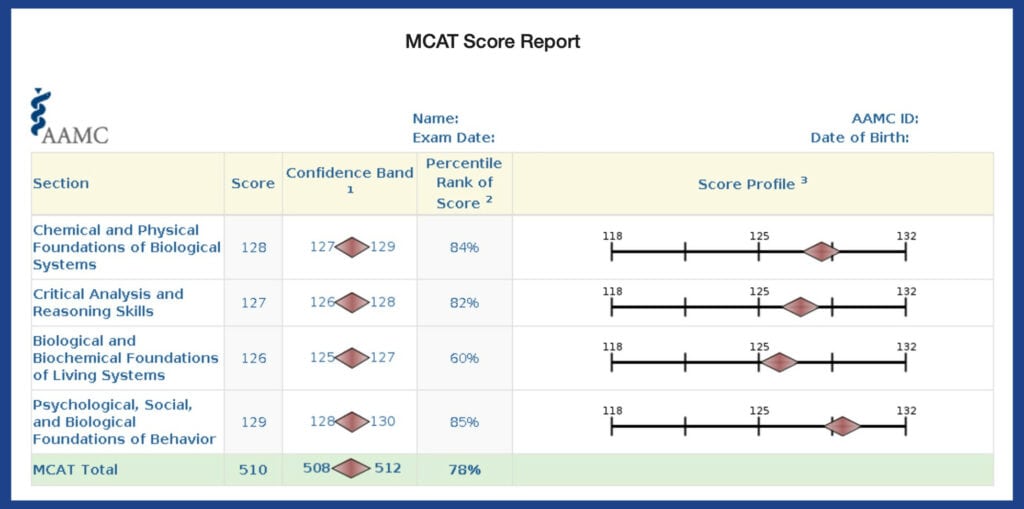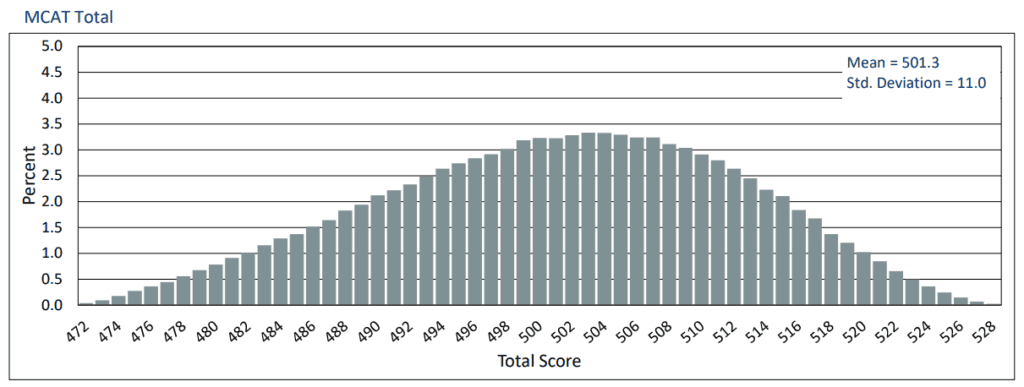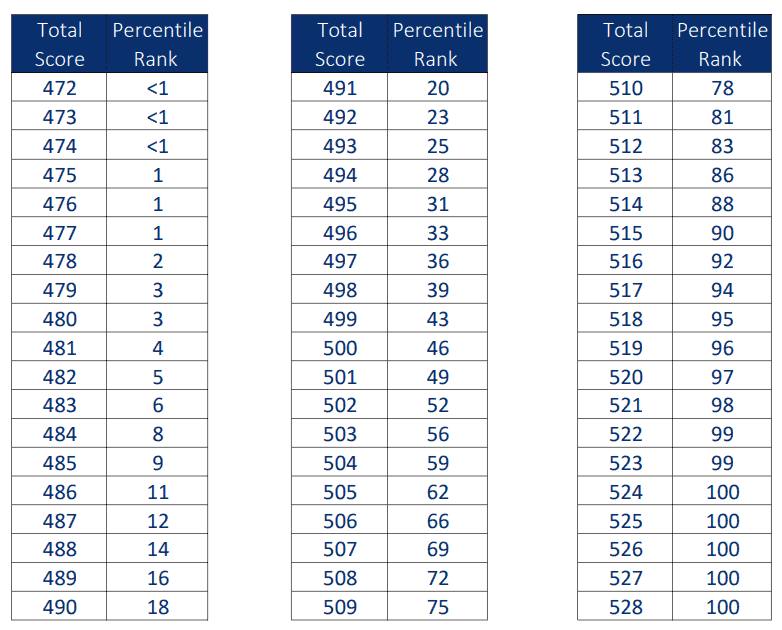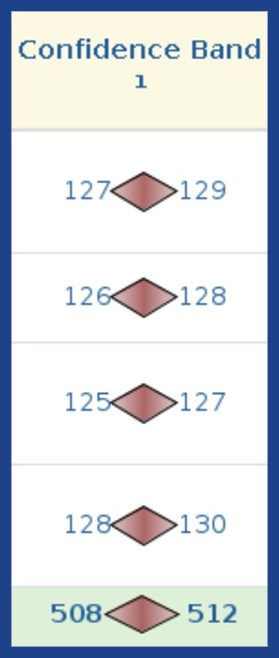The Medical College Admission Test (MCAT) is one of the most significant steps in the admissions process to medical school.
How exactly is the MCAT scored? The MCAT exam is scored using a scaled and equated score for each of its four sections. Rather than scoring on a curve or using a raw score, the MCAT converts a student’s raw section scores to a scale between 118-132. This compensates for variations in difficulty that may otherwise create inequity in scores.
The AAMC uses private, predetermined metrics to scale test scores. The section scores are totaled up for a total MCAT score range of 472 to 528.
I’ve spent more than 10,000 hours teaching and tutoring students to excel at the MCAT, so this is a conversation I’ve had with countless students before. So, let’s define MCAT scoring in more detail.
MCAT Sections
There are four main sections of the MCAT. These sections are designed to gauge different areas of knowledge essential for a future medical student. They include:
- Chemical and Physical Foundations of Biological Systems
- Critical Analysis and Reasoning Skills (CARS Section)
- Biological and Biochemical Foundations of Living Systems
- Psychological, Social, and Biological Foundations of Behavior
The four sections of the MCAT are weighted equally. Your MCAT score is the total of the section scores.
When I tutor students for the MCAT, I first identify the section(s) that may be the most challenging for each individual student. That way, we can work on increasing the individual section scores that might otherwise lead to a below-average total score.
Related: Medical School Requirements and Prerequisite Coursework

The MCAT Scoring Process
The MCAT is not scored based on the raw number of correct answers like most standardized tests, and it is not scored on a curve either. Instead, your MCAT score report will present a scaled and equated score.
The Association of American Medical Colleges (AAMC) does this to address the flaws in standardized testing, like having easier or harder questions on different versions of the test. By scoring in this manner, medical school admissions committees have a better indication of each test taker’s knowledge.
Try a free MCAT practice test from MedSchoolCoach to assess your knowledge.
Raw Score vs. Scaled Score
The raw score on the MCAT is determined by counting the number of questions answered correctly in each of the four sections. Each section is scaled to a score between 118-132, and the scaled scores for each of the four sections are added to equal a total of between 472-528.
For example, a student who gets 40 questions right out of the 59 questions in the Chem/Phys section may receive a scaled score of 126. On another administration of the exam, getting 40/59 questions right on Chem/Phys section may only result in a 125.
This goes back to how each version of the MCAT is different and the AAMC uses the scaled scoring system to control for these differences.
Should I answer all MCAT questions, even if I have to guess? The AAMC doesn’t penalize for wrong answers, so test takers are encouraged to answer all questions, even if they have to make an educated guess. There’s also no penalty for unanswered questions, but it’s a missed opportunity to earn points.
The AAMC does not release raw scores. You will only receive your scaled scores for each section of your MCAT.
Percentile Rank
To give you and admissions committees an idea of your score compared to all other test takers, the AAMC provides a percentile rank. After your raw scores are converted into a scaled score, they are compared to all of the other med school hopefuls that have taken the exam in the last 3 years to assign your MCAT percentile rank.

What is the difference between a scaled score and a percentile? A scaled score is the score you have received on the test after it has been equated and totals between 472-528. Score percentiles give you an idea of your score relative to other MCAT test takers and fall into a percentile between <1 and 100.
For instance, if we ask what score is a 70% on the MCAT? This means that your score is in the 70th percentile. In other words, you performed better than 70% of the test takers.
In the current testing year, a 70th percentile score equals a scaled score somewhere between 507 and 508. However, this data changes slightly year over year.

Confidence Band
Confidence bands are used to account for variability on test day. The confidence band on your MCAT score report indicates the margin of error for scores. Test scores are not perfect indicators of your knowledge or abilities, so the AAMC provides a range around each score.

This range shows where your “true score” most likely lies. It’s a reminder that any single test score is an estimate, not an exact measure. Confidence bands encourage medical schools to look at candidates with scores in the same range as performing at the same level.
For example, let’s say you obtain an MCAT score 510. The AAMC will include a confidence band of 508 to 512 in your score report. This indicates that your true score is not necessarily a 510 but is most likely within the range of 508-512.
This confidence band is why I caution students to retake the MCAT only if you are confident you can increase your overall score by greater than 4 points.
If you score a 510 on the MCAT on your first attempt and improve to a 513 on your second attempt, medical school admissions committees will notice that the confidence bands of your two scores overlap. Rather than thinking that you’re a 513 scoring student, they may likely conclude that your true score is somewhere between 510-513.
Improving your score on the MCAT by more than 4 points on a retake will ensure that your confidence bands don’t overlap so that admissions committees give you credit for the score improvement.
Students who get MCAT tutoring from our team increase their score by 12 or more points on average. Let us help you boost your MCAT score.
Score Profile
The MCAT score profile provides a deeper look into your individual section performances. Since all four sections of the MCAT are weighted equally for your total score, the score profile will help you see the breakdown of each section.
Medical school admissions committees can see from this profile where you excel and which of your areas of expertise might need further development.
Average MCAT Score
For the 2022-23 application cycle, the average MCAT score was:
- All test takers: 501.3
- Medical school applicants: 506.5
- Matriculants (students accepted to medical programs): 511.9
Many test takers who receive relatively low scores on the MCAT do not apply to medical school. Only 41.2% of applicants were accepted to medical school during the last application cycle.
The average MCAT score of matriculants was 511.9. This doesn’t mean you have to score above 511.9 to get into medical school, but it does give you a sense of what a competitive MCAT score is.
An “average” MCAT score just won’t cut it in this fierce competition. You need to aim higher to secure an acceptance.
Average Total MCAT Score (April 2015 – April 2023)
| Test Year | Average MCAT Score |
| May 2022 – April 2023 | 501.3 |
| May 2021 – April 2022 | 501.5 |
| May 2020 – April 2021 | 501.1 |
| May 2019 – April 2020 | 500.9 |
| May 2018 – April 2019 | 500.5 |
| May 2017 – April 2018 | 500.2 |
| May 2016 – April 2017 | 499.6 |
| May 2015 – April 2016 | 500.0 |
Have you already taken the MCAT and want to determine your chances of being accepted to medical school? Our Medical School Chance Predictor takes your GPA and MCAT score to give you the odds of getting into med school.
Best MCAT Score
The highest MCAT score possible is 528. The AAMC doesn’t report a true value for this, but fewer than 0.1% of test takers achieve this score. Most matriculants (students accepted and who attend at least one medical program) score above the 70th percentile.
However, to be among the top MCAT test takers, scores should be in the range of 515-528, or in the top 10%. Medical school applicants who score within the 509-514 range are considered highly competitive, falling within the top 25% of all test takers.
Differentiating between average and best scores can help potential medical students set their goals and understand their competitiveness in the medical school application process.
For instance, Ivy League medical schools boast much higher average MCAT scores for their matriculants than, say, Caribbean medical schools. If your score is on the low end, the Ivy League may not be a good fit for your application.
MCAT Scores for the Top Medical Schools
Medical schools at the forefront of medical research, innovation, and education have a naturally more competitive admission process. They typically expect higher MCAT scores than the national average.
For instance, here are a few examples of median MCAT scores for matriculants to a few prestigious medical schools in the US:
- Johns Hopkins University School of Medicine: 522
- Yale School of Medicine: 522
- New York University Grossman School of Medicine: 522
- Harvard Medical School: 521
- Stanford University of Medicine: 519
Pre-med students often aiming for these top medical schools must be prepared to achieve high MCAT scores, in addition to an above-average GPA, notable extracurriculars, and a stand-out personal statement. As a Harvard Ph.D. alumnus myself, I can attest to the fact that this ambitious goal will require a standout student!
Try the MedSchoolCoach MedSchoolExplorer to learn where your GPA and MCAT scores fall compared to your target schools.
How To Boost Your MCAT Score
While MCAT scores are undeniably important, they are just one component of a medical school application. Other factors like GPA, letters of recommendation, personal statements, extracurriculars, and your interview performance play significant roles.
Of course, a good MCAT score will catch the eyes of admissions committees, but a holistic presentation of one’s capabilities and potential is still important.
A good score on your MCAT is a product of well-planned preparation and sticking to your study schedule. Starting early, utilizing study materials, engaging in MCAT prep courses, and taking practice exams can make a difference.
A reminder for retaking the exam: You can only retake the MCAT 3 times in a testing year and 7 times in a lifetime. Make sure you’re adequately prepared before you retake the exam so as to not waste one of your attempts.
Beyond the incremental time, cost, and potential burnout, there’s no guarantee that you’ll score significantly higher on a retake. Many students score the same or lower because they don’t make the necessary adjustments to their MCAT preparation to improve their score.
If you’re not sure what you could do to better prepare for the MCAT, sign up for a free MCAT consultation. In these calls, we discuss how you prepared for your previous MCAT attempts, what you did wrong or didn’t do with your studies, and how working with a MedSchoolCoach MCAT tutor can give you the extra boost you need to reach your target score.
Schedule a free consultation with the enrollment team at MedSchoolCoach to see how we can help you boost your MCAT score.



